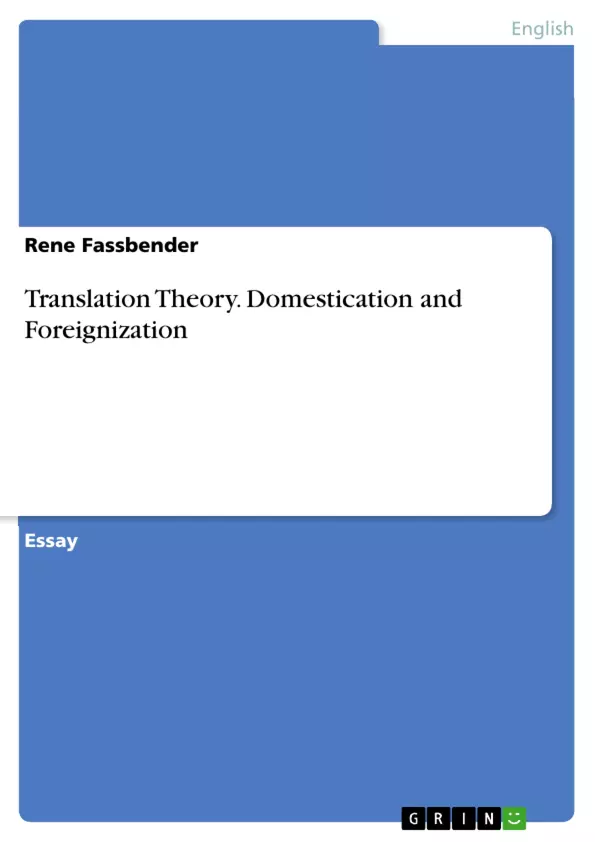This paper discusses what is meant by ‘domestication’ and ‘foreignization’ of a text and to what extent are these concepts useful for translators today.
Inhaltsverzeichnis (Table of Contents)
- What is meant by ‘domestication’ and ‘foreignization’ of a text and to what extent are these concepts useful for translators today?
- Early translation theory: Literal vs. free translation
- Cicero: Keeping the ‘figures' of thought
- John Dryden: ‘Properties’ of languages
- The role of the translator as intermediary
- Schleiermacher’s two methods of translating
- Berman’s twelve deforming tendencies
- Venuti’s concepts of domestication and foreignization
- Domestication: Transparency and the invisible translator
- Foreignization: A political and ideological commitment
- The influence of foreignization on a receiving culture
- The limits of foreignization
Zielsetzung und Themenschwerpunkte (Objectives and Key Themes)
This essay explores the concepts of ‘domestication’ and ‘foreignization’ as presented by Lawrence Venuti, examining their historical roots and relevance in contemporary translation practice. The essay analyzes how these concepts relate to the longstanding debate in translation studies regarding the translator's obligations to the source text (ST) and the target audience (TT). The author argues that these concepts are not only relevant to literary translation but also have broader implications for cultural exchange and the shaping of receiving cultures.
- The historical development of the concepts of ‘domestication’ and ‘foreignization’
- The impact of translation choices on the reception and interpretation of the ST
- The role of the translator as an intermediary between cultures
- The interplay of cultural values, preferences, and expectations in translation
- The influence of the publishing industry on translation practices
Zusammenfassung der Kapitel (Chapter Summaries)
- The essay begins by outlining the fundamental concepts of ‘domestication’ and ‘foreignization’, tracing their origins to the longstanding debate about literal versus free translation.
- The author examines the historical context of translation theory, highlighting key figures like Cicero and John Dryden, who wrestled with the tension between faithfulness to the ST and the desire to produce an engaging and effective translation for the TT audience.
- The essay delves into Friedrich Schleiermacher’s influential treatise on translation methods, where he proposed two mutually exclusive approaches: moving the reader towards the writer or moving the writer towards the reader.
- The author then explores Antoine Berman’s “twelve deforming tendencies,” which identify potential pitfalls of over-naturalizing or domesticating a ST, highlighting the dangers of ethnocentric translation.
- The essay concludes by focusing on Venuti’s concepts of domestication and foreignization, emphasizing the significant role of the publishing industry in shaping translation practices.
Schlüsselwörter (Keywords)
The primary keywords and focus topics include: domestication, foreignization, translation theory, literary translation, cultural exchange, ethnocentrism, publishing industry, translation methods, translator's role, source text, target audience, cultural values, preferences, and expectations.
Frequently Asked Questions
What is domestication in translation?
Domestication is a translation strategy that minimizes the foreignness of the source text for the target reader, making the translation feel natural and 'transparent'.
What is foreignization according to Lawrence Venuti?
Foreignization is a strategy that retains cultural and linguistic elements of the source text, deliberately breaking target-language conventions to highlight the text's foreign origin.
Who was Friedrich Schleiermacher in translation theory?
Schleiermacher was a 19th-century theorist who proposed two methods: either the translator leaves the writer in peace and moves the reader toward him, or leaves the reader in peace and moves the writer toward him.
What are Berman's 'twelve deforming tendencies'?
Antoine Berman identified twelve tendencies, such as rationalization and clarification, that often lead to an ethnocentric domesticating translation that destroys the foreignness of the work.
Why is the role of the translator often 'invisible'?
In domesticating cultures, a 'good' translation is often defined by its fluency, which makes the translator's intervention and the source text's foreignness invisible to the reader.
- Citar trabajo
- Rene Fassbender (Autor), 2009, Translation Theory. Domestication and Foreignization, Múnich, GRIN Verlag, https://www.grin.com/document/310362



